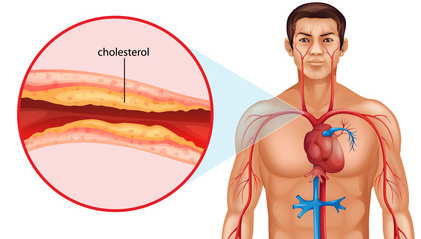With no doubt, one of the most widely known types of tea is the hibiscus tea. Hibiscus tea offers a wide range of health benefits, and tea lovers love its sour, tangy taste, and crimson blood color. It is made from the popular hibiscus flower scientifically known as Hibiscus Sabdariffa or Roselle This plant is known to be rich in vitamin C, which boosts the immune system against the invasion of infections and diseases. Of course, you don’t need to worry about gaining fat because it is a low-calorie drink and full of antioxidants that fight against inflammation and degeneration of your skin.
The Hibiscus tea may be popular for these awesome health benefits, but the truth is, it’s just a tip of the iceberg. In this post, we will break down each stunning health benefit that you gain just by consuming hibiscus tea.
“I put hibiscus flower in every cup of tea I have. It’s sweet, sexy, and cleansing.” — Mario Batali
 Cholesterol Management
Advertisements
Cholesterol Management
Advertisements

Since hibiscus tea is low in calorie content and it does not contain caffeine, it is safe to say that it can reduce a significant portion of cholesterol in your body. Aside from that, hibiscus tea contains a hypolipidemic property, which is beneficial for people who are suffering from blood sugar resistance.
 Liver security
Liver security
The liver does the most important job in processing the nutrients that came in your body as well as flushing out the toxins such as alcohols and caffeine. Therefore, it is important that you pay special attention when it comes to this special organ. You can take care of your liver by drinking this type of tea. Its antioxidant properties reduce the free radicals around your liver, which can help in fighting diseases. Moreover, studies show that these antioxidants also help fight common liver diseases.
 Menstrual cramps and pains
Menstrual cramps and pains
Most women suffer from dysmenorrhea and mood swings whenever their menstruation cycle comes in. This is mainly as a result of hormonal imbalance. If you are a victim, hibiscus tea will restore your hormonal balance and thereby reduce your menstrual cramps and pains.
 Boosts digestion
Boosts digestion
This medicinal tea also possesses diuretic properties that ease your digestion and aid you to lose some weight. It also improves your gastrointestinal system to promote regular bowel movement. Most tea lovers seek hibiscus tea as their primary treatment for constipation.
 Weight Loss
Weight Loss

We have already seen that hibiscus tea can aid in your weight loss. Hibiscus tea contains amylase production properties that help your stomach digest carbohydrates and starch, which are difficult to digest with in the first place.
Many big supplement sites provide solid information that hibiscus is known to reduces food intake because it has appetite-suppressing effects.
 An anti-depressant
An anti-depressant
If you’re suffering from severe depression, we recommend that you drink hibiscus tea. It contains minerals, flavonoids, and vitamins that are known to reduce anxiety and depression. It soothes and calms your nerves, giving you a relaxing sensation.
 A Perfect Summer Drink
A Perfect Summer Drink
Whenever we think about drinking tea, the first thing that comes to our mind is that it’s hot. We typically drink tea as a morning beverage. However, this is not the case with hibiscus tea. This type of tea can be taken hot or cold. Moreover, it complements any sweetener you have, making it the perfect type of tea to drink this summer to help quench your thirst.
 Dissolving phlegm treatment
Advertisements
Dissolving phlegm treatment
Advertisements
If you’re suffering from a cough or cold, the solution to your problem is hibiscus tea. Research shows that it can help dissolve the buildup of phlegm inside your lungs.
Conclusion
There’s no doubt that hibiscus tea comes with a list of its remarkable health benefits. However, you may need to watch out if you have some special conditions. People who are taking birth pills and those who are expectant should avoid drinking this type of tea at all costs. The reason for this is that certain elements contained in hibiscus tea may distort, healthy reproductive processes affecting fertility or childbearing.




